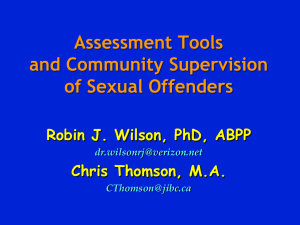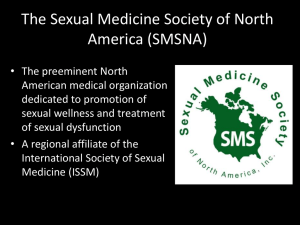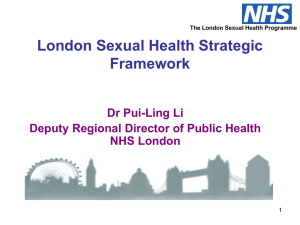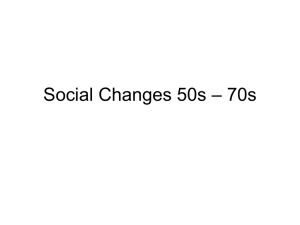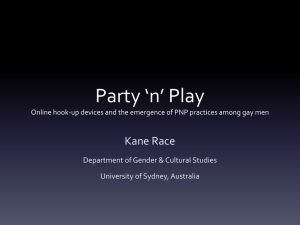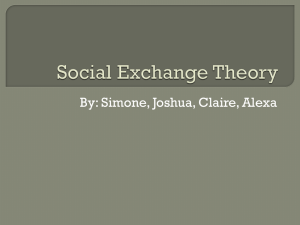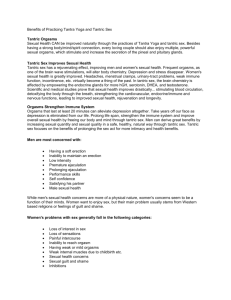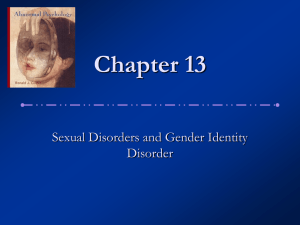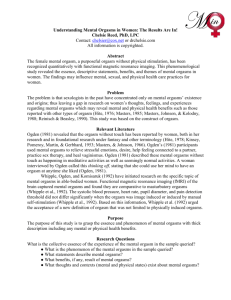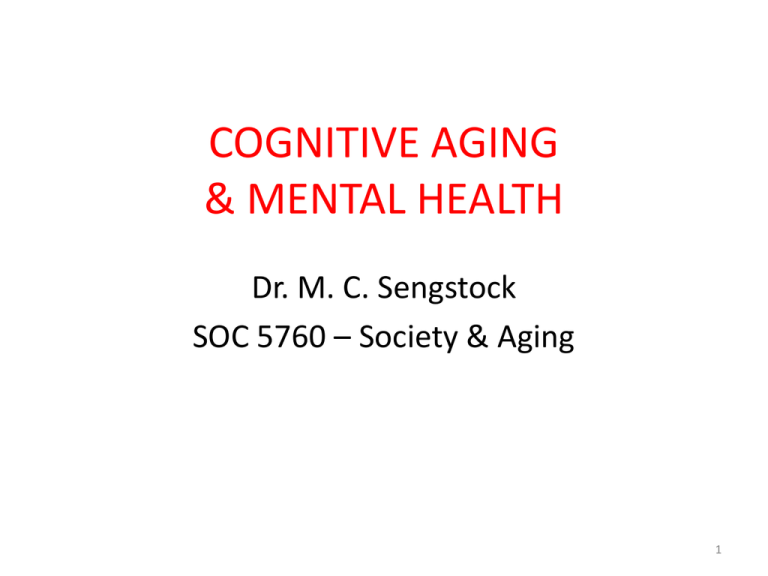
COGNITIVE AGING
& MENTAL HEALTH
Dr. M. C. Sengstock
SOC 5760 – Society & Aging
1
MENTAL CAPACITY IN OLD AGE
“Intelligence”
• Theoretical Limit of an Individual’s Mental
Performance
• 3 Dimensions:
– 1. Content of Knowledge
– 2. Operations an Individual Performs Using
Knowledge
– 3. Products Derived from These Operations
PRIMARY MENTAL ABILITIES
Mathematical Reasoning
Verbal Meaning
Inductive Reasoning
Spatial Orientation
(Includes “Fluid Intelligence”)
Crystallized Intelligence
(Includes “Social Judgment”)
CLASSIC MENTAL AGING PROCESS
•
•
•
•
•
•
Based on WAIS:
“Wechsler Adult Intelligence Scale”
Measures Performance Decline
On 11 Sub-Tests After Age 65:
6 Verbal Scales
5 Performance Scales
FACTORS AFFECTING
INTELLIGENCE AFTER 65
Chronological Age
Physical Health
Cohort Differences
Structural Changes in the Brain
Educational Attainment
Sensory Loss
Nutritional Deficits
Psychological Challenges
LEARNING & MEMORY PROCESSES
Primary Memory: Temporary State:
Holding & Organizing Information
Secondary Memory: 2nd Stage:
Information Is Retained Permanently
Older People: More Likely to Have Problems
With Short Term Memory
PROBLEMS TESTING OLDER ADULTS
• Research on Mental Capacity Done on
Comparisons With Younger People …
• Primarily Students (Easy to Recruit)
• Puts Older Adults at a Disadvantage …
• Students Used to Taking Tests & Motivated
• Older Adults NOT Used to Taking Tests
• NOT Motivated to Take Tests!
FACTORS AFFECTING LEARNING &
MEMORY FOR OLDER ADULTS
•
•
•
•
•
•
•
Lighting Levels – Font Size – Time Constraints
Older Adults’ Learning Can Be More Effective:
Increase Font Size & Lighting Levels
Reduce Time Constraints
Make Learning Tasks More Relevant
Test More Frequently
Provide Comfortable, Relaxed Environment
IMPROVING COGNITIVE
ABILITIES IN OLD AGE:
“USE IT OR LOSE IT!”
• Retraining; Keeping Mind Active
– Play Bridge; Line Dancing; Puzzles
• Mnemonics, Verbal Riddles, Codes
– Mental Codes to Remember & Learn New Information
• External Aids:
– Keep Lists; “To Do” Reminders
• Ginkgo biloba:
– Disputed Claims to Improve Brain Circulation, Dementia
– Side Effects: Bleeding, G-I Problems; Dizziness
MENTAL DISORDERS
AMONG OLDER ADULTS
Depression
Suicide
Alcoholism
Drug Abuse
Parkinson’s Disease
Dementias (Various)
DEPRESSION
Primary Emotional Disorder of Old Age
Can Lead To Suicide
Symptoms Can Be Confused With:
• Normal Aging
• Losses Associated With Old Age:
– Death of Family, Friends
– Loss of Valued Home & Other Items
SUICIDE
• Older Adults At Greater Risk Than Any Other
Age Group
• 17% - 25% of Completed Suicides Are 65+
• 2003 Rate Per 100,000:
– 11.0 For General Population
– 13.5 For 65+
– 18.0% for 85+
– More Prevalent Among Men
PARKINSON’S DISEASE
• Neuro-Degenerative Disorder
• Begins With Loss of Muscle Control, Tremors
in Feet & Hands
• Slow & Limited Movement
• Can Manifest Dementia-Like Symptoms
ALCOHOLISM & DRUG ABUSE
• ALCOHOLISM:
• Addiction to Alcohol Less Likely in Persons 60+
• Elderly Alcoholics Were Usually Alcoholics
Since Middle Age
• DRUG ABUSE: Deliberate or Accidental?
• Older Persons Use Disproportionally Large
Number of Prescription & OTC Drugs
• About 30% of Prescription Drug Expenditures
• Many Unneeded/No Longer Needed
DEMENTIA IN OLD AGE
•
•
•
•
Damage To Brain Tissue
Results in Impaired Cognitive Functioning
Inability to Recall Events in Recent Memory
Problems With Attention Span, Comprehension,
Judgment
• Disoriented Re Time, Place, Person
• Affects 2-7 Million People 65+
– 75-79: 12%;
85-89: 54%;
90+: 84%
• Some May Be Reversible
– Due to Poor Nutrition, Brain Tumors, Alcohol, etc.
2 TYPES OF DEMENTIA IN OLD AGE
Long-Term Disorders:
• Exhibit No Significant Change With Old Age
Aged-Onset Mental Disorders:
• Originate With Old Age
AGED ONSET MENTAL DISORDERS
MULTI-INFARCT (STROKES)
• Tissue Death Due to Loss of Blood Flow
• Sudden Onset
ALZHEIMER’S DISEASE
• Apparently Due to Structural Changes in Brain
• Most Common Irreversible Dementia in Later
Life (45-55% of Late Life Dementias)
ALZHEIMER’S DISEASE
Impairments from Alzheimer’s Disease
• Intellect (Understanding, Conceptualization)
• Judgment (Evaluating, Making Decisions)
• Orientation (To Time, Place, Situation)
– Urinating in Public; Inappropriate Clothing
• Affect (Lack of Control of Emotions)
– Aggression; Behavior Control; Wrong Emotions at Wrong
Time
• Sensory-Motor Loss
– Impaired Speech, Walking, Bowel/Bladder Control
• Enormous Stress for Family
COMPARATIVE MEMORY LOSS
NORMAL FORGETTING ALZHEIMER’S FORGETTING
Forget Person’s Name Not Remembering Person
When Reminded
Forget to Set Alarm
Clock
Forgetting HOW to Set
Alarm Clock
Forget Where You
Parked the Car
Forget Where You Are &
How You Got There
GENDER & MENTAL DISORDERS
• Men Have More Late Life, Non-Organic Mental
Disorders Than Women
• But Women Are Seen More Often By Mental
Health Professionals
• WHY?
• Men Are Used to Having Control Over Lives
• Men More Disturbed By Lack of Control
• Men More Reluctant to Accept Help
MENTAL HEALTH TREATMENTS
IN OLD AGE
PSYCHOTHERAPY:
• Seldom Used With Aged
• Why? Aged More Resistant to Psychotherapy?
• Psychotherapists’ Reluctance to Treating the
Aged?
MENTAL HEALTH TREATMENTS
IN OLD AGE
MEDICATION:
Problems Using Psychotropic Drugs with Aged:
• Drugs Tested on Young: Aged Impact Unknown
• Aged Have Multiple Drugs Interactions
• Aged Often Over-Medicated for Management
• Medicalization of the Social (Wanderers)
• Medications Can CAUSE Problems for Elderly
– Stupor, Dizziness, Forgetting, Falls
SEXUAL BEHAVIOR IN OLDER ADULTS
• Major Issue: Should Elderly Participate in Sex?
• People Believed the Old Should Not Have Sex
– Sex Was for Procreation They Couldn’t Do That
– Frequent Opposition from Adult Children
• In 1950s & 60s: Nursing Homes Prevented !t!
– Considered Sex Among The Old Inappropriate
– Had “Male” & “Female” Wings
– Prevented Visits Between Wings
– Wouldn’t Let Married Couples Share a Room
THE REALITY OF SEX IN OLD AGE
•
•
•
•
Sex: More Than Intercourse & Orgasms
Also Expression of Feelings: Affection, Loyalty
Affirmation of One’s Body & Its Functioning
Sex Is: Biological, Emotional, Intellectual,
Spiritual, Behavioral, Sociocultural
• Research Shows Older Adults Continue Their
Interest in Sex
• Myths About Sex & Elderly Continue
IMPACTS ON SEXUAL
BEHAVIOR IN OLD AGE
•
•
•
•
Physiological Changes (Body Can’t Act Same)
Physical Fitness
Physical/Social Environment (Living Changes)
Individual Personal Sexual History, SelfConcept, Self-Esteem
• Psychological Meaning Attached to Previous
Experience
MYTHS RE SEXUAL ACTIVITY
IN OLDER ADULTS
Due to Age-Related Physiological Changes …
• Older Adults Cannot Engage in Sexual Activity
• Older Women Cannot Have Orgasms
• Older Men Cannot Achieve An Erection
• Age Eliminates Sexual Functioning/Fulfillment
• Elderly Have Less Need for Being Touched
REALITIES RE SEXUAL ACTIVITY
IN OLDER ADULTS
•
•
•
•
Sexual Behavior Fairly Stable Through Life
Frequency of Sex Doesn’t Differ By Age
It Does Take Longer to Achieve Orgasms
Sexual Dysfunction Main Barrier to Sexual
Activity – Not Lack of Desire
• A Gentle Touch Can Provide Support
• Some Nursing Homes Still Take Pains to Keep
Male & Female Residents Separate
AGE-RELATED PHYSIOLOGICAL
CHANGES: WOMEN
•
•
•
•
•
•
•
Most Changes Related to Menopause
Concern Re Using HRT-Hormone Replacement
Slower Response to Sexual Stimulation
Reduction in Vaginal Elasticity, Lubrication
Pre-Orgasmic Plateau Phase Longer
Fewer, Less Orgasmic Contractions
Rapid Return to Pre-Arousal State Post Orgasm
AGE-RELATED PHYSIOLOGICAL
CHANGES: MEN
•
•
•
•
Erection May Require More Direct Stimulation
Erection Slower, Less Full, Disappears Quickly
Orgasm More Rapid, Less Intense
Longer Period Between Orgasm & Subsequent
Erections
• Occasional Lack of Orgasm During Intercourse
• More Seepage or Retrograde Ejaculation Is
Experienced
• Impact of Viagra
PSYCHOSOCIAL FACTORS
AFFECTING SEXUAL ACTIVITY
•
•
•
•
•
•
•
Past History of Sexual Activity
Attitudes Toward Non-Intercourse Activities
Reactions to Illness or Physiological Changes
Availability of Partner (Esp. for Women)
Performance Anxiety (Widowed Syndrome)
Opportunities for Privacy
Societal Attitudes – Particularly Toward Those
in Institutions
SUMMARY
AGING BRINGS CHANGE IN:
Mental Processes, Mental Health, Sexual Activity
However, Change Is a Matter of Degree
Absent Dramatic Physiological Change …
Normally Results in Slow Decline
Most Elderly Physically, Mentally Competent
Capable of Engaging in All Types of Activities,
Including Sex, Until Quite Late in Life




